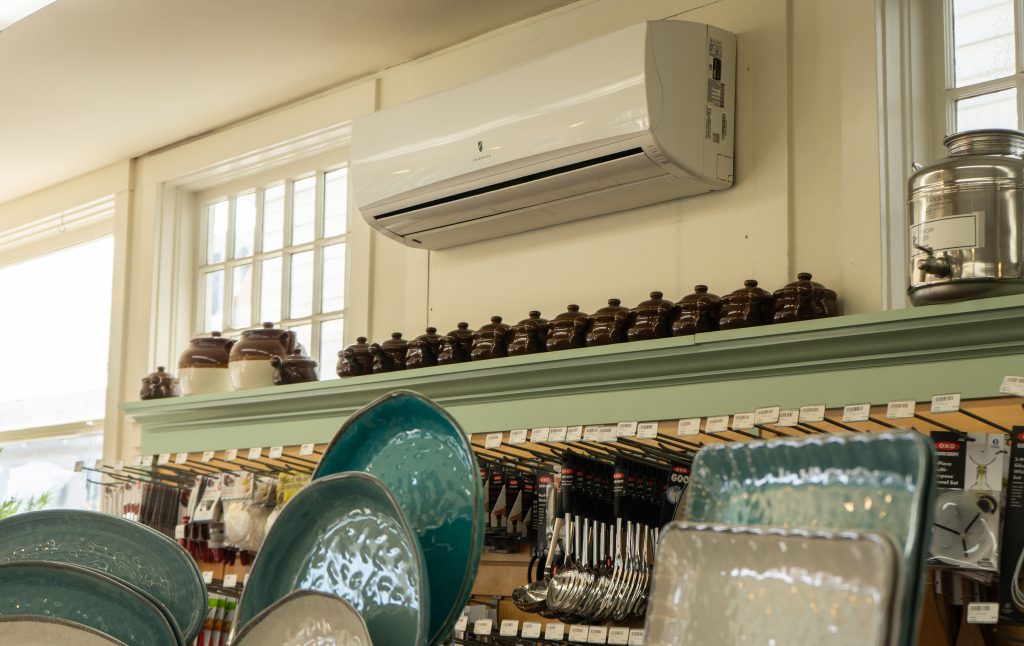Heat Pumps are one of the most efficient ways to cool and heat your business.
Heating and cooling are the largest energy expenses for a business. By upgrading to higher efficiency systems, businesses can enjoy long-term reduced energy costs, decrease equipment maintenance time, reduce greenhouse gas emissions, and create a comfortable work environment. If you have a boiler or furnace, learn about ways to increase the efficiency of your system.

Rebate Information
The way rebates are paid out may vary by equipment type. Applications require that the customer cover the cost upfront, install the equipment, and then apply for the rebate after the installation is completed. Instant incentives are paid at the point of sale from participating distributors. There is no paperwork involved, and the discount is applied to the purchasing invoice.
| Equipment Type | Incentive Type | Incentive Amount | Efficiecny Requirements | Pre-Approval Required | How to Apply |
|---|---|---|---|---|---|
| Air Source Heat Pumps | Application | $2,000/ton | Refer to MassSave.com/cihpqpl for list of equipment and minimum requirements | No (unless total installation is >150 tons or New Construction) | For more information, visit Mass Save. |
| Variable Refrigerant Flow (VRF) Systems | Application | $2,800/ton | Refer to MassSave.com/cihpqpl for list of equipment and minimum requirements | No (unless total installation is >150 tons or New Construction | For more information, visit Mass Save. |
| Ground Source Heat Pumps | Application | $3,600/ton | Refer to MassSave.com/cihpqpl for list of equipment and minimum requirements | No (unless total installation is >150 tons or New Construction | For more information, visit Mass Save. |
| Packaged Terminal Heat Pumps > 10,000 BTU/h | Instant Incentive | $350/unit | EER – 10.7 COP – 3.1 | Yes, if installing more than 10 units | For more information, visit Mass Save. |
| Packaged Terminal Heat Pumps ≤ 10,000 BTU/h | Instant Incentive | $350/unit | EER – 12.1 COP – 3.5 | Yes, if installing more than 10 units | For more information, visit Mass Save. |
| HVAC - Controls, Water Source Heat Pumps, Air Source Air Conditioner, Pumps | Instant Incentive | Customer incentive included in select equipment cost at time of purchase | Varies depending on equipment | No | For more information, visit Mass Save. |
Heat Pumps (central ducted or mini-splits) work by pulling heat from the air or from underground and using it to heat the building in the colder months. Heat pumps then flow in reverse and use a refrigerant to cool your business in the warmer months. Central ducted systems can use existing duct systems, whereas mini-splits are used for buildings without ductwork.
Ground Source Heat Pumps work by extracting heat from the ground during cold weather and distributing it throughout your business. During warmer months, this process is reversed to provide cooling.
Variable Refrigerant Flow (VRF) systems use the same concept but can allow individual zones to be heated or cooled concurrently without the need for ductwork.
Packaged Terminal Heat Pumps (PTHPs) are commonly found in hotel rooms and are an efficient alternative to traditional PTAC units that rely on expensive electric resistance heat.